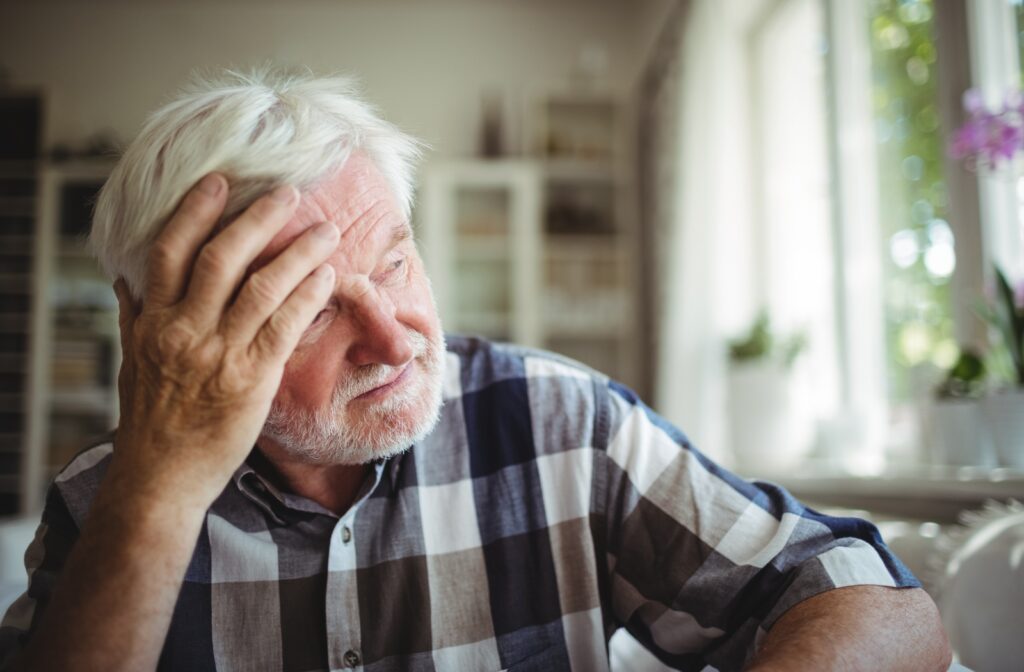Balancing Senior Quality of Life
Life is full of ups and downs, good times and bad times. As much as we wish we could be happy all the time, it’s normal to feel down sometimes too. However, there’s a difference between a healthy balance and a cause for concern.
Depression can affect anyone at any age, but some factors can increase the risk. For example, seniors can be vulnerable to depression if they lose contact with a caring community or aren’t motivated to stay social.
An individual’s emotional state is impacted by multiple factors, from environmental to genetic. In addition, seniors have the added aspects of aging and major life changes, such as retirement or memory issues. So it’s no surprise depression can affect seniors. But how common is elderly depression, and how can we help?
What Is Depression?
Most people think of depression as feeling sad or unmotivated. While that can be true, we all experience mood cycles of excitement and lack of motivation. However, clinical depression is not a normal part of aging and shouldn’t be ignored.
Depression or major depressive disorder is a medical illness affecting how you feel, think, and act. The mood disorder is treatable, often through medication, psychotherapy, electroconvulsive therapy (ECT), and lifestyle changes.
Notably, sadness, grief, or bereavement is not depression. Although these mental states can co-exist, they are distinct and affect behavior differently.
Recognizing Depression
Many signs of depression can seem related to grief or sadness over significant life events or adjusting to aging. As a result, symptoms are ignored. It can be challenging to recognize depression, but here are common symptoms of geriatric depression:
- Apathy
- Sadness
- Feelings of worthlessness
- Irritability
- Fatigue & sleep problems
- Crying spells
- Restlessness
- Difficulty concentrating
- Withdrawal
- Appetite changes
- Suicidal ideation
- Physical aches and pains
Symptoms must last at least 2 weeks for a depression diagnosis. The function and behavior of the individual must also be significantly different from their normal state.
How Common Is Depression in the Elderly?
The prevalence of depression in older adults depends on multiple factors. Some of the strongest indicators are physical health and living conditions.
According to the CDC, depression in seniors living in a community ranges between 1-5%. However, 11.5% of seniors requiring home healthcare or hospitalization experience depression.
A depression diagnosis can often be overlooked because older adults have other illnesses or health conditions. 80% of seniors have at least one chronic medical condition, and 50% have two or more.
There’s an evident influence from medical conditions and physical abilities on mental health. Some studies suggest natural body changes resulting from aging create an increased risk for depression, cognitive impairment, and dementia. The symptoms are typically expressed as physical effects, which are easier to observe and describe.
For example, imagine a senior is having trouble getting out of bed. It’s easier to describe the problem as aches or limited physical capacity due to soreness. It can be difficult for a senior to admit they didn’t feel like getting out of bed.
Ways to Help
Many seniors avoid getting help because of the stigma against mental illness and psychiatric treatment. Older adults also tend to express symptoms as physical ailments, delaying the diagnosis of depression in favor of a physical diagnosis.
When offering help to a senior, be tactful. You may have good intentions, but it can feel invasive. For some elderly, it can be upsetting knowing your loved ones see you as fragile or incompetent. Instead of telling them how you want to approach their depression, ask how you can help and tell them you care.
From daily exercise to healthy eating habits, lifestyle changes can make a significant difference in prevention and treatment. In addition, family and friends can get involved by doing group activities, such as cooking together, joining a hobby group, or family social events.
Having abundant social connections improves positive health-seeking behavior. Family members don’t need to stick like glue 24/7 to show their love. Instead, it would help if you also encouraged social connections from their community. With more positive relationships available, seniors will feel comfortable with their support network.
Although any type of social activity can be beneficial, it’s crucial to encourage physical activity. Exercise and physical activity promotes better sleep, improve energy levels, and reduce feelings of depression or stress.
Supporting Mental Health in the Elderly
If someone you care about is experiencing depression, they need support. The first step is seeking a professional diagnosis about their mental well-being and physical health. Then, you can offer help.
Encouraging social connections and activities is the best way to prevent elderly depression. Talk to your loved ones about how they feel about their community. If they’re feeling isolated or lonely, they may benefit from a closer community.
For seniors in need of more social connections, assisted living can give them more opportunities to engage with their community. Contact us to learn more about our welcoming community and helpful amenities. Find more support for seniors with the Villages at the River Club.




